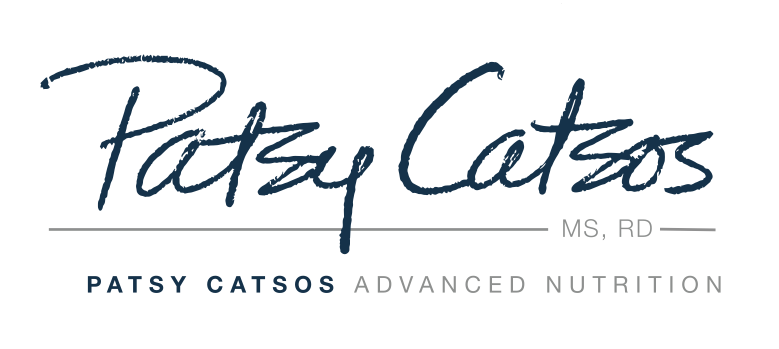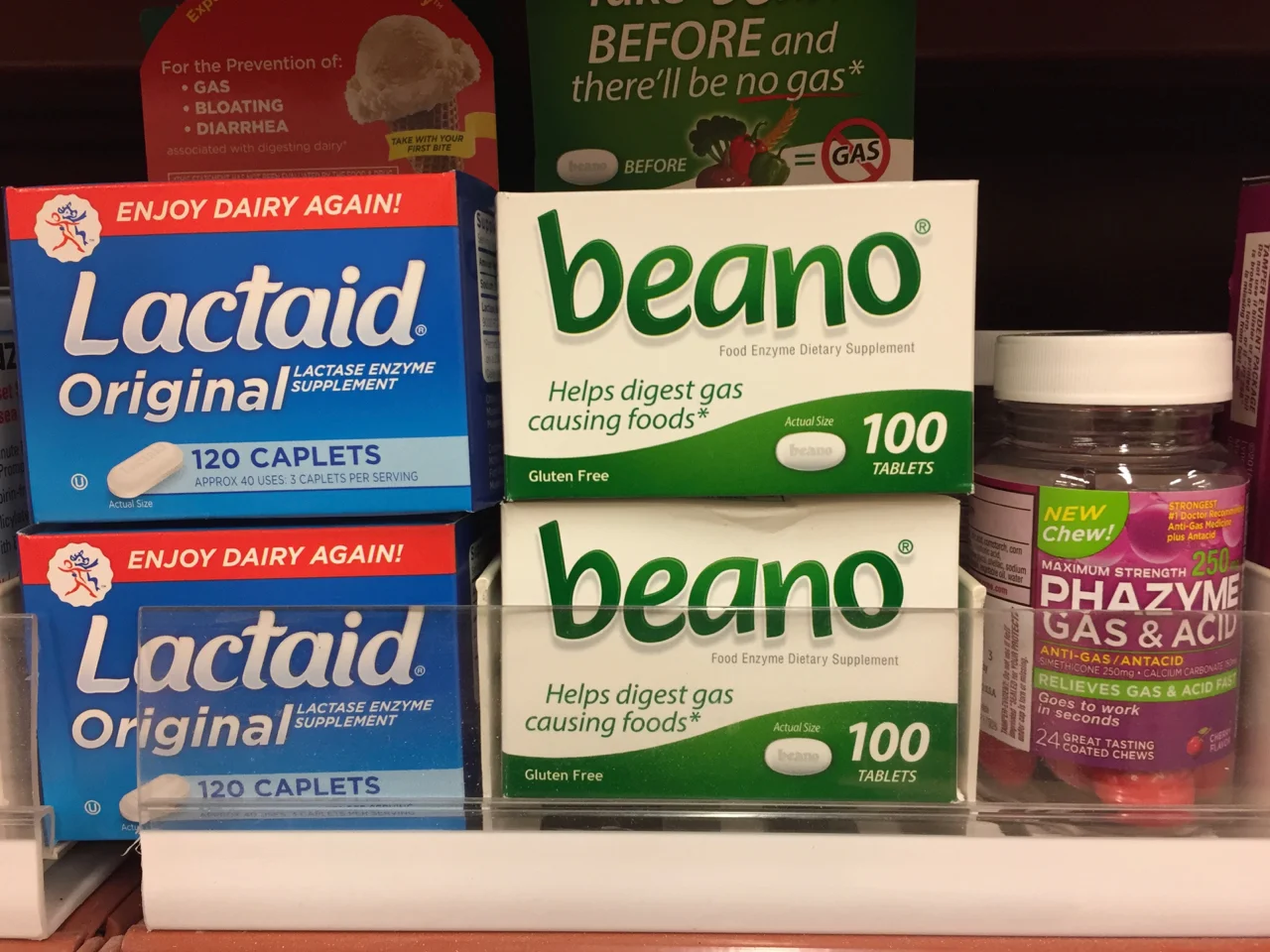Q. Are there enzyme pills I can take to reduce my IBS symptoms when I want to eat FODMAPs?
A. Maybe.
Wouldn’t it be great if you could just take enzyme pills and then eat whatever you want? A few of you may find that you can. It depends which FODMAPs are not tolerated, and how you respond to the enzymes. You won’t know until you try, and there is little to lose by experimenting with them - after the reintroduction phase of a low-FODMAP diet. If they don’t help, you can simply stop taking them.
This 2014 article from the Mayo Clinic points out the typical reservations about over-the-counter (OTC) enzyme supplements. They might not work, and there has been little or no evidence that they will improve the digestion of healthy people, though the author points out that some patients “insist on using OTC enzymes” despite the lack of evidence. Hmmm. I get it. After reviewing the enormous collections of supplements that some patients bring to consultations for my review, I agree that there may be some over-promotion of supplements in general. I, too, want to protect my patients from being parted with their money for no good reason. However, I don’t think that OTC digestive enzymes are an unreasonable thing to try.
People with IBS often react to things differently from “healthy adults” when it comes to digestion. We should be looking at studies which are specific to people with IBS whenever possible. And there are some new studies available regarding enzymes aimed at fructose and GOS intolerance.
It is also worth noting that statistics looking at groups of people, as the traditional scientific method does, may not be relevant to the variable way that individuals seem to respond to OTC digestive enzymes. Looking at the individual data points of study participants (when they are available) suggest that some people appear to benefit a great deal, others not at all. I believe that people deserve the opportunity for personalized care and to seek solutions that work for them. No one is “average.”
Lactose
In a previous post, I explained what enzymes are and why you probably should not use them during the FODMAP elimination diet and reintroduction process. You learned that lactase (to digest lactose) is the only FODMAP-related enzyme that the human body normally produces, and that some people don’t produce enough of it. I have recommended lactase enzymes (along with lactase-treated milk products) to my lactose-intolerant patients for years, though I am not aware of any recent studies on lactase supplements and IBS. They work very well for some people. By the end of the reintroduction phase of the program in The IBS Elimination Diet and Cookbook, you will probably have worked out how much milk, yogurt, fresh cheese or ice cream you can handle at once without the help of a pill. You can try a lactase pill when the portion you plan to eat exceeds your own personal limit. Lactase won’t help you tolerate aged cheese and butter, since they are virtually lactose-free already.
Fructose
An enzyme called xylose isomerase, which is not made by the human body, can convert fructose to glucose and back. A 2012 study looked at oral xylose isomerase supplements in a group of patients with fructose malabsorption. (These patients did not necessarily have IBS, although IBS patients do not appear to have been excluded.) The results showed that taking the enzyme with fructose improved fructose absorption and reduced abdominal pain and nausea (but not bloating).
Unfortunately, most foods that contain excess fructose also contain other FODMAPs, which this enzyme will not affect. The list of excess-fructose-only foods is short, and includes mangos, sugar-snap peas, honey, agave, and high-fructose corn syrup. Since I’m not usually interested in helping patients eat more sweets, I don’t typically recommend this supplement in my practice.
Bottom line: People with intolerance to fructose only, and who tolerate other FODMAPs well, might be able to enjoy larger portions and a wider variety of fruits with the help of this enzyme.
Sorbitol and Mannitol
There are no OTC supplements that can claim to help improve tolerance of sorbitol or mannitol.
Oligosaccharides
Alpha-galactosidase is an enzyme which breaks down galacto-oligosaccharides (GOSs), which are long chains of the sugar glucose. Humans don’t produce alpha-galactosidase as a digestive enzyme.* GOSs are meant to be left unabsorbed by humans, and therefore to be available for fermentation by normal gut bacteria. In other words, they are prebiotics. GOSs are one of the types of fiber found in beans, lentils, nuts, rye, and wheat. Onions also contain some GOSs, though they are primarily a source of the other FODMAP oligosaccharide, known as fructans. Oral supplements of alpha-galactosidase "digest" GOS, but won’t break down fructans or other FODMAPS in those same foods.
There have been two recent studies of oral alpha-galactosidase in IBS patients. The first one compared Danish IBS patients who took oral alpha-galactosidase supplements with a group who took a placebo (fake supplement). Symptoms improved equally in the two groups during the treatment period, which led the authors to conclude that there was “no evidence for routine use” of such supplements in IBS patients, although they allowed that certain individuals might benefit from it.
The second paper was presented in abstract form at Digestive Disease Week 2017 by Caroline Tuck (PhD, Accredited Practising Dietitian), formerly of Monash University and now a post-doctoral research fellow at Queen's University, Canada. In this experiment, a small group of IBS patients was studied during three days of low-FODMAP diet, followed by three days of high-GOS diet. Some patients were given a placebo (fake supplement) with the high-GOS diet while other received oral alpha-galactosidase supplements. Symptoms for patients taking the placebo got worse on the high-GOS diet. For those patients getting a full dose of the enzyme treatment, on the whole, symptoms were not worse when eating high-GOS foods. Dr. Tuck concluded, “There is preliminary evidence that some individuals who are intolerant to galacto-oligosaccharides might benefit from trying oral alpha-galactosidase enzyme supplements.”
I thought one the most interesting part of Dr. Tuck’s presentation was seeing the low-FODMAP versus high-GOS symptom scores of the study participants represented individually on a graph. This was a great reminder that “treatment groups” are really collections of individuals, each of whom may have a unique response to the treatment.
The full report of this research, which was conducted at Monash University, is not yet published. (Tuck C, Taylor K, Gibson P, Barrett J, Muir J, 2017. Increasing symptoms in irritable bowel symptoms with ingestion of galacto-oligosaccharides are mitigated by α-galactosidase treatment. American Journal of Gastroenterology. In press, accepted 05/07/2017).
Neither of these studies was designed to figure out how and why the enzyme might improve symptoms. Presumably, breaking GOS down to glucose, which is well—and rapidly—absorbed by almost everyone, improves tolerance.
Bottom line: oral alpha-galactosidase may help some individuals with intolerance to GOS include portions of beans, chick peas, lentils, nuts, rye, and wheat (and maybe onions) in their diets without an increase in IBS symptoms.
Tips for Trying Digestive Enzymes
When shopping for digestive enzymes, keep an eye out for added mannitol, sorbitol, and fructose, which may be used as sweeteners.
Unfortunately, absorbing FODMAPs more effectively with the help of digestive enzymes isn’t the whole IBS story, and even well-absorbed FODMAPs can be poorly tolerated. But given that digestive enzymes are unlikely to cause harm, there is little reason not to try them if you have found you are intolerant to lactose, fructose or oligosaccharides. You might be one of the lucky ones who finds they make a clear difference. If you decide to try digestive enzyme supplements, use these tips.
- Avoid products containing other FODMAPS to which you are intolerant. For example, some supplement manufacturers add mannitol to their products, so read labels carefully. I’ve contacted the manufacturers of some popular products, and customer service representatives are not able to discuss how much mannitol they contain, so it is probably best to avoid them.
- Look for alpha-galactosidase supplements containing about about 300 GaIU units of alpha-galactosidase. It's difficult to supply brand names in a way that won’t be out of date almost immediately, due to frequent changes in supplement ingredients, but there are several brands available, usually marketed with the word "bean" in the name.
- Look for lactase supplements with at least 3000 units of lactase. These are easy to find in any drugstore, under a variety of brand names. Chewables are more likely to contain FODMAP sweeteners.
- Since they can be expensive, consider reserving enzyme supplements for special occasions, when you aren’t in control of the food. For example, use other strategies to reduce your intake of the problem FODMAP at home, but bring digestive enzymes with you when dining at a restaurant or someone else’s home.
- Lactase pills probably don’t render the milk products as 100% lactose-free as those that are pre-treated at the milk or yogurt plant before packaging. If you are lactose intolerant, buy pre-treated products for routine use at home and carry the lactase pills for use on special occasions.
- Remember that taking an enzyme supplement does not give you a free pass for an unlimited amount of FODMAPs. Keep portions small at first, and experiment with bigger portions over time.
- Take enzyme supplements with the first bite of food or sip of beverage. They must be in physical contact with the food as it goes through your digestive system. Enzymes won’t work well if you take them before you leave home for an ice cream or restaurant meal.
- If you find the enzyme supplements irritate your stomach, or if any signs of an allergic reaction occur, stop taking them.
- Consider trying the same foods or meals with and without the enzyme supplements, as an experiment. Or try going without the supplements for a week after you’ve been taking them for a while. If they don’t make a clear difference, don’t bother continuing to take them. Taking them for a longer period of time will not make them start working.
- Don't forget other strategies. You may find you can tolerate foods containing lactose, fructose and oligosaccharides if you keep the portions small enough.
*To clarify, humans do make a metabolic enzyme by almost the same name, alpha-galactosidase A, that circulates in the blood. Alpha-galactosidase A is not a digestive enzyme.
This page may contain affiliate links. We are a participant in the Amazon Services LLC Associates Program, an affiliate advertising program designed to provide a means for us to earn fees by linking to Amazon.com and affiliated sites.


